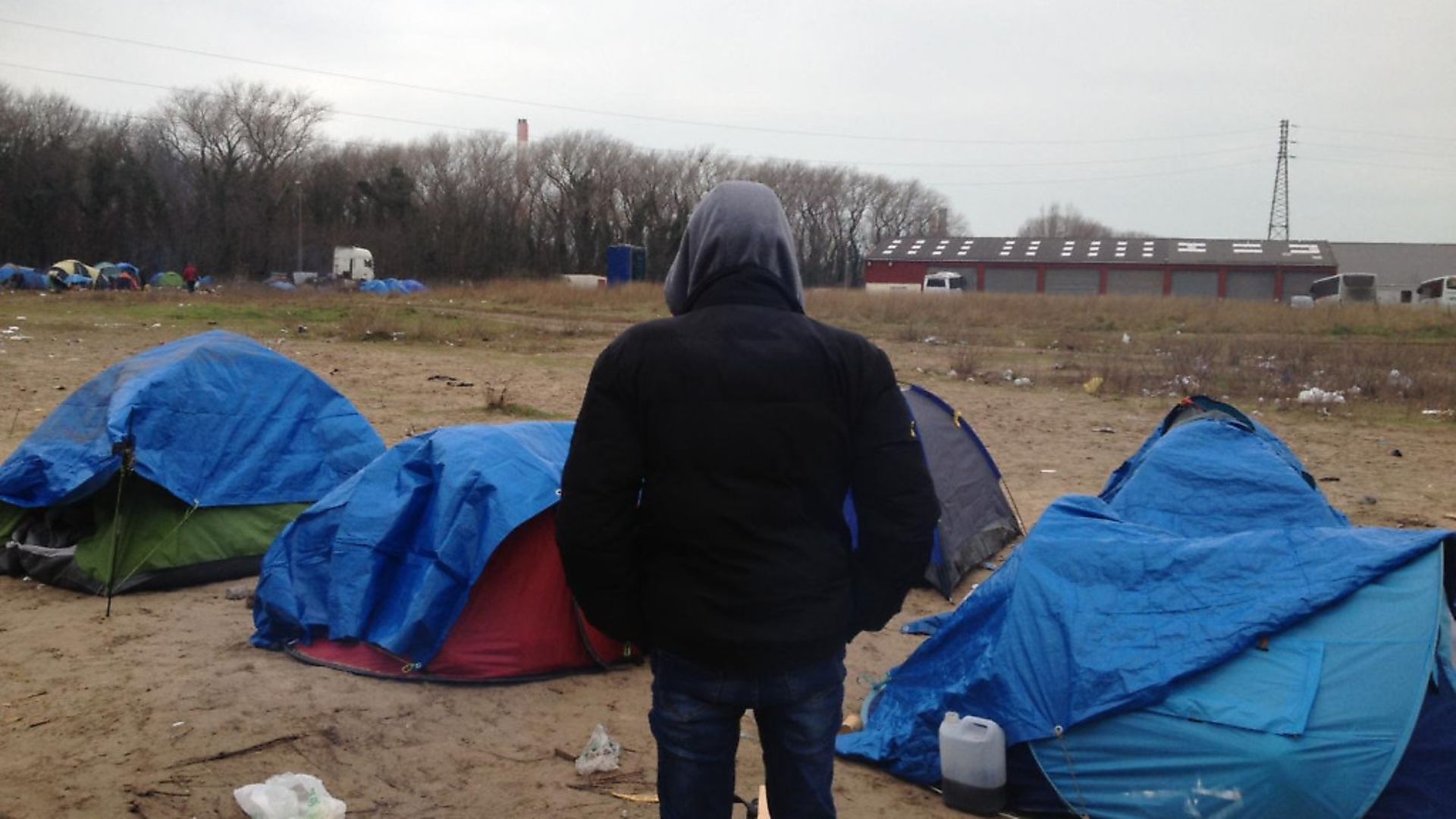
As other avenues are closed off to them, JOE WALLEN meets the desperate migrants in northern France willing to risk the perils of a Channel crossing in small craft.
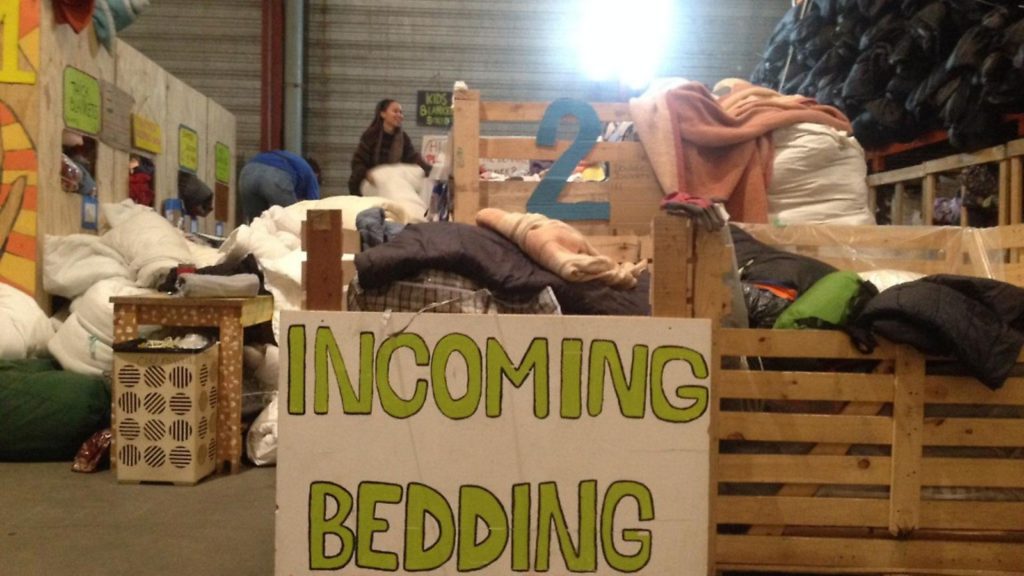
Those spending winter in the makeshift migrant camp on the outskirts of Calais are well aware of the waves they are making on the opposite side of the Channel.
‘Tell your Sajid Javid that he will have blood on his hands. We are dying because of him,’ one of them shouts across at me, as I visit the site. Behind the man, his infant daughters cowers. Wearing a thin jacket, she is shivering uncontrollably, while a constant stream of mucus flows from her tiny nose.
They are just two of the hundreds of residents of the informal Rue des Garennes settlement in the north of the city, just inland from the beach and neighbouring ferry terminal. It has recently emerged as the focus of attention as a result of the flow of migrants who have made their way from here across the Channel in small boats. Since November, more than 230 people are known to have reached the UK via this perilous route, prompting home secretary Javid to declare a ‘major incident’, requiring the redeployment of patrol vessels from the Mediterranean.
The conditions in the camp, which sits on abandoned wasteland below a chemical plant, are deplorable. Its inhabitants live in small clusters of tents and huddle around makeshift fires, their only source of warmth. Many suffer from a series of physical and psychological ailments.
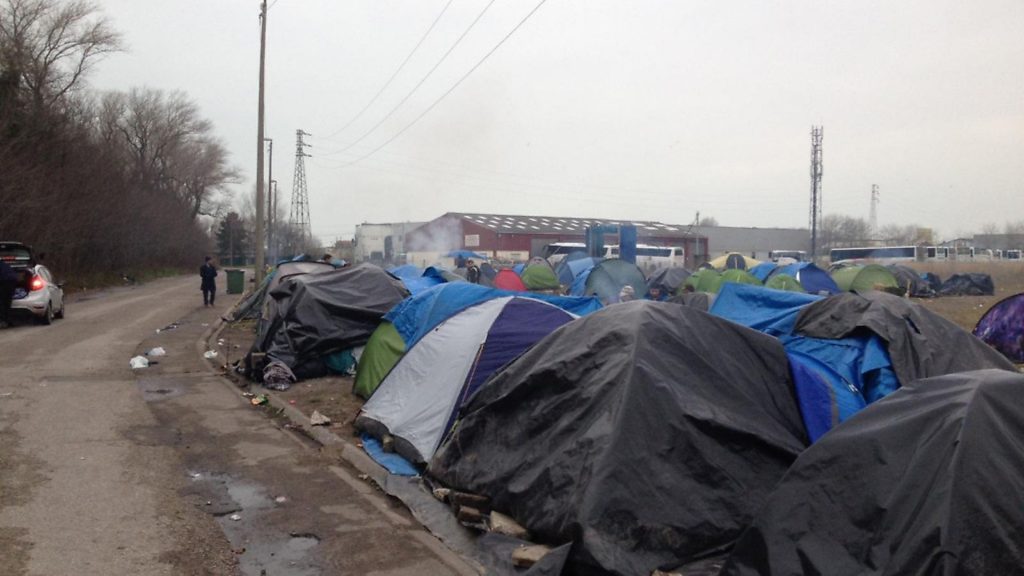
The residents have access to a doctor only once a week and tell me of near-constant fevers, coughs and headaches as a result of living rough at a time when temperatures barely hover above freezing. One new arrival – a young Iraqi Kurd, who I was told was just 17 – sat motionless, staring across the expanse. A group of Sudanese migrants tell me the young man has behaved liked this since arriving in the camp and often let out screams in his sleep.
According to Help Refugees, the umbrella aid organisation providing humanitarian assistance to those in northern France, there are around 2,000 migrants living rough around Calais and Dunkirk.
Help Refugees believe this includes 250 unaccompanied minors – those under the age of 18 who are without a parent or guardian. In the absence of support from the local government in Calais, Help Refugees essentially keep the thousands of migrants alive. It provides clean and warm clothing, tents and blankets, hygiene products and firewood as well as, crucially, three meals a day.
However, competition over scarce resources is common and migrants are unable to work or attend school, meaning unrest is a regular occurrence. The proximity with which the migrants live to the town’s residents has long been a source of grievance, with informal camps also existing off Rue Du Pont Trouille and near the Centre Hospitalier de Calais.
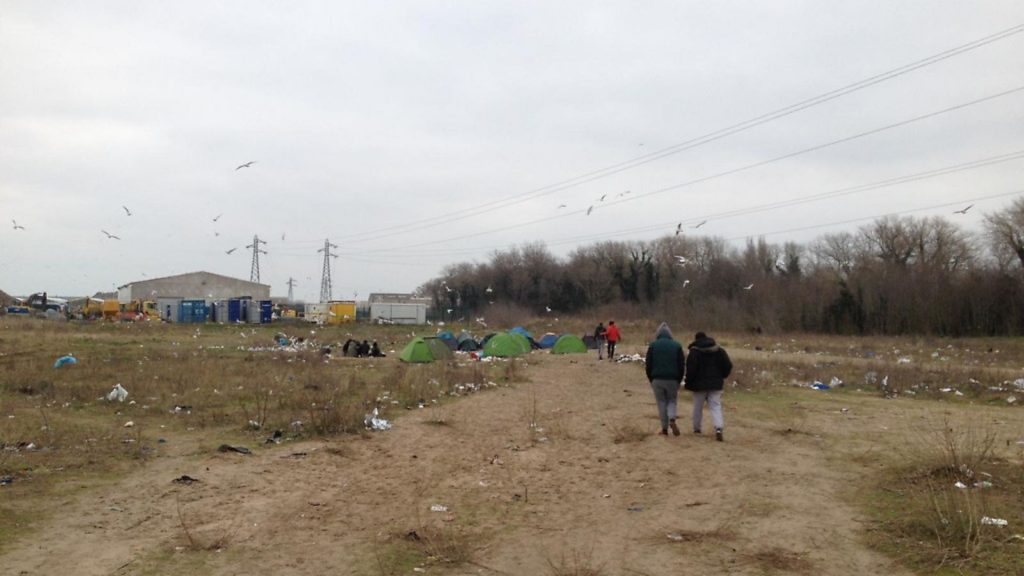
Following unrest and shootings between the migrants last February, residents complained to the French government that the city was in danger of becoming [sic] ‘the United States’. Others claimed that young women felt too scared to go out alone at night and that vehicles had been damaged. In short, an abhorrent situation has been allowed to continue for both migrants and residents alike.
While the number of migrants in Calais is not as high as in 2016 when 9,000 migrants lived in the so-called Jungle – located just the other side of the main route to the port to the Rue des Garennes – conditions are considered worse, because of the increasingly informal nature of settlements.
‘The conditions in Calais now are dire. They are the worst we have ever seen,’ says Maddy Allen, field manager for Help Refugees in northern France.
‘We continue to see images and hear of the Jungle from two years ago but after the bulldozing of that there is no fixed camp here in Calais and we are a year into daily police evictions, temperatures are dropping to the minuses at night, people are very much in survival mode.’
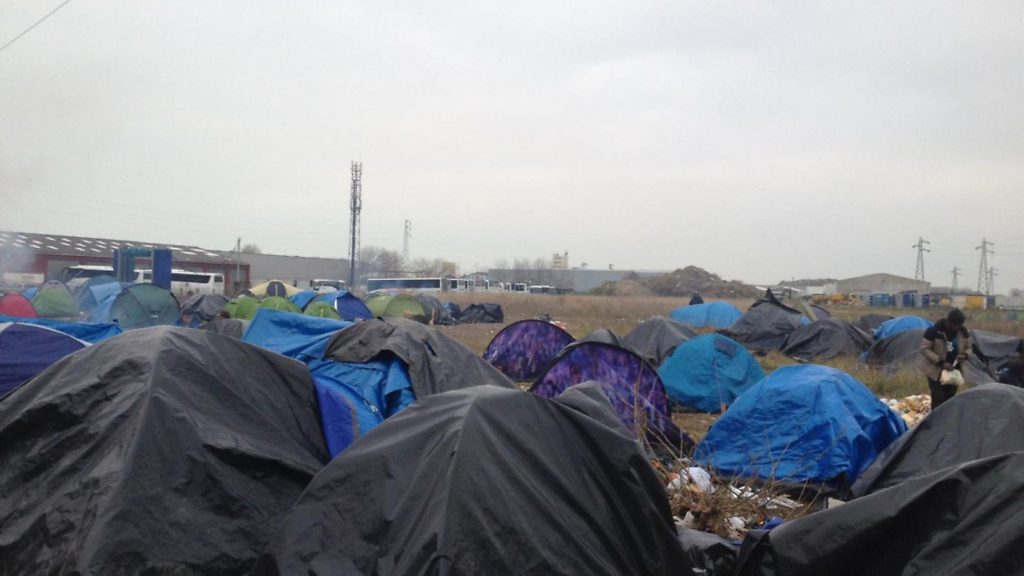
After the destruction of the Jungle, the Calais migrant issue slipped down the news agenda in the UK. However, it lurched back into British consciousness over the Christmas period, with a succession of reports of migrants attempting the crossing in small craft. In 2017, the French authorities recorded just 12 attempted crossings by boat. Last year, the figure climbed to 71, with a total of 539 people attempting the crossing – 80% of them November and December.
Javid’s hard-line response – seen by many as an attempt to further his leadership ambitions at Westminster – has included questioning whether those making the crossing as even ‘genuine’ asylum seekers, since they have not sought sanctity in the first ‘safe’ country reached. His message to those in Calais considering making the crossing was clear: ‘If you do somehow make it to the UK, we will do everything we can to make sure that you are often not successful.’
However, those I met were confident in the strength of their own claims for asylum. The father who had given me his message for Javid said he was a member of Iran’s Christian minority, a group which the UN has said face widespread persecution. Iranians make up the largest proportion of migrants in Calais at 38.8%, according to a census carried out by Help Refugees in November. According to the Home Office, they also made up the majority of those recorded crossing in November and December. The Christians have also recently been joined by many Iranian Kurds.
‘I had so many problems in my area, they are arresting and putting Kurds in jail,’ Mohammed*, 40, from Sanandaj in Iranian Kurdistan, told me. ‘They arrested my family members and said they would do the same to me so I left.’
He found Javid’s claims that he should settle in a neighbouring ‘safe’ country laughable. ‘Where am I meant to go?’ he asks, ‘To Iraq? To Turkey? All of these countries are not friends to the Kurds.’ Indeed, it is striking just how much news of Javid’s response has filtered through to the camps. There is widespread frustration at his position, and I hear many angry comments asking how the son of economic migrants is trying to close the door on those seeking a better life.
Mohammed claims to have already tried to cross the Channel several times by dinghy, with his last attempt coming as recently as several weeks ago. It was an anti-climax, he recalls with a hollow laugh, after the motor on his boat broke down several hundred metres from the French coast and he was quickly picked up by the coastguard.
According to Mohammed and other Iranians in the camp, smugglers and their middlemen live part-time among the migrants and in city town’s hostels, acting with relative impunity. Their malign influence over the settlement is clear, with many groups of migrants refusing to speak to me, claiming that if smugglers saw them they could face retribution.
While those I speak to refuse to identify the smugglers operating in Calais, they say they are mostly Iranians, Afghanis or Iraqis who have been in the city for several years, know the coastline well and have good connections in each of the camps of Northern France, to source as many customers as possible for the final part of their journey – across the Channel.
Typically, Mohammed said that a smuggler would purchase a dinghy before touting around the camps to sell a place on board, usually between 1-2,000 euros. When the places are filled, the trafficker tells those making the crossing that they will be picked up from a specific location in Calais, before being transported to a secluded beach, from which the vulnerable, inflatable vessel sets off – into the grey, winter seas and across one of the busiest shipping routes in the world.
The recent influx of Iranian migrants seems to be a major factor in the steep rise in dinghy crossings in the final two months of 2018. Until October, they were able to travel, visa-free, to Serbia, from where they were able to make their way to the Channel coast. Unlike many migrants here from other countries, the Iranians tend not to have had the traumatic experience of crossing the Mediterranean by boat. This could explain why they are more willing to risk it now.
Mohammed also tells me that Iranians tend to be among the few nationalities in the camp that can occasionally find the sums necessary to pay smugglers for a spot on the boats, because they are more likely to be able to draw on extended family networks at home and in other parts of Europe to pooling the required funds. Ultimately, the rise in boat crossings is a simple matter of supply and demand. The smugglers need to raise the money to buy the boats. They now have more people in northern France with the cash to fund this method of travel. For Iranians, the UK is seen as an attractive country, as it already has a significant population of their compatriots, as many as 83,000 in 2011, while Iranian asylum applications had a 47% success rate in 2017. This compares to 40% for Afghans and 20% for Iraqis.
The switch towards using boats is also partly driven by increased security measures aimed at stopping migrants trying to stow away on lorries, or enter the Channel Tunnel, while the rapid deterioration of already poor living conditions around Calais has created an added immediacy – despite the dangers of crossing by boat at this time of year. The freezing conditions in the camps make a boat crossing a worthwhile gamble. There is no chance that their prospects will improve by waiting. One issue which does not seem to be a factor, incidentally, is Brexit. While Javid’s response has certainly cut through to the migrants, the looming prospect of changes at the border which are likely to follow the UK’s departure from the EU have not. Not one migrant I spoke to said that it was a relevant issue.
One that did crop up though, was the actions of the French authorities, which Maddy Allen said were helping to drive people onto the water. ‘Police violence is deeply embedded into the culture here,’ she says. ‘We see dog handlers releasing dogs onto people in the port – simply migrants being in the wrong place at the wrong time – and excessive use of police violence and chemical agents like CS gas. We’ve even had reports over the last two weeks from Dunkirk of police pouring bleach into migrants’ tents.’
The organisation recorded 244 alleged human rights abuses in 2018 involving police treatment of migrants. Tamer*, a 20-year-old from Darfur in Sudan, said that officers had destroyed his tent every two days and subjected him to beatings, pepper-spray and arrest and detainment without charge – actions which left him determined to reach the UK. ‘I left Sudan many years ago, when I was 16 after the (pro-government) Janjaweed militia killed my brother, my father and my uncle,’ he explains.
Despite citing legitimate claims for asylum, Tamer and Mohammed must both risk their lives to cross the Channel, in order to apply for refugee status in Britain. According to the European Union law, the Dublin Regulation, refugees must apply for asylum in the country where they arrive and are fingerprinted. However, despite the support the EU has given refugees in recent years, the policy remains somewhat controversial.
Mohammed, for example, was fingerprinted in Dresden, Germany, but does not want to apply for asylum there, as he claims he was the victim of far-right violence in the country. Similarly, Tamer refuses to apply in France, after the treatment he has received from police, claiming it is not a safe country.
‘Why would you want to apply for asylum in a country where you have been beaten awake in the morning and tear-gassed at night?’ Allen says. ‘This systemic state violence has to stop.’
Faced with a grim existence in northern France, then, the lure of the Channel – despite the immense dangers of crossing it and the frosty reception outlined for them on the other side by Sajid Javid – remains strong for those migrants living around Calais.
On my last night in the city, a 16-year-old Afghan boy is the talk of the camp. He told others he had fled, fearing for his life at home after his family were killed by the Taliban. Living alone in the woods near Calais, he had attempted to stow away under a lorry headed for port. He had fallen off, badly fracturing his arm and was lucky to still be alive.
Whether they try to enter in the back of a truck, or on a small, exposed inflatable boat, there is no safe route open to these people. And yet they will not stop trying. It seems, therefore, just a matter of time before that chilling prophecy shouted at me by that Iranian father, comes true.
Joe Wallen is a freelance foreign correspondent who has covered the European migrant crisis from North Africa, Spain, Italy and Eastern Europe. He has previously written for the Telegraph, Independent and Al Jazeera on the topic. *Names changed to protect identities










